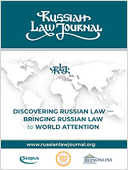Russian law journal
Abbreviation:
Russ. Law J.
Published by:
Moscow State Lomonosov University Law Faculty
Publisher Location: Moscow, Russian Federation
Journal Website:
https://www.russianlawjournal.org/index.php/journal/issue/archive
Range of citations in the SafetyLit database:
2023; 11(5) --
2023; 11(5)
Publication Date Range:
2013 --
Title began with volume (issue):
1(1)
Number of articles from this journal included in the SafetyLit database:
1
(Download all articles from this journal in CSV format.)
pISSN = 2309-8678 | eISSN = 2312-3605
LCCN = 2014267024 | OCLC = 958653413
Find a library that holds this journal: http://worldcat.org/issn/23098678
Journal Language(s):
English
Aims and Scope (from publisher):
The Russian Law Journal is one of the first academic legal journals in English to be published in Russia. Our goal is to provide scholars worldwide with comparative papers on recent legal developments not only in Russia, but also in Eurasia, other jurisdictions and on the international level. The idea to establish this journal belongs to the following scholars of Moscow State Lomonosov University Law Faculty: Gleb Bogush, Nataliya Bocharova, Dmitry and Anastasia Maleshin and Sergei Tretyakov. We want to bring the Russian academic legal tradition closer to the international environment and make Russian legal scholarship more accessible to other scholars and well-known worldwide.
Our editorial policy is governed by independent quality control. It is guaranteed by the Editorial Council and Editorial Board. We are proud to have such eminent scholars in our Editorial Council which is composed of professors from world-leading law schools: Yale, Harvard, Sorbonne, Cambridge, NYU, etc. Our Editorial Board is composed of scholars from leading Russian law schools (Moscow State Lomonosov University, Saint-Petersburg State University, Moscow State Kutafin Law University, Higher School of Economics, etc.).
First, due to the origin of our Journal, Russian law is our priority. We want Russian legal theories, practice and legislative innovations to be known in the international academic environment. One of the Russian disadvantages is insularity of our scholars. At the same time there are many interesting projects and theories which are unknown on the international level.
Second, we are very flexible in our editorial policies. We welcome articles from other countries. We want to make our journal the platform of the international comparative discussion on different legal subjects regardless of nationality. Our scope is not limited to any national law, but is open to other jurisdictions.
Third, comparative research is also our goal. In spite of the view that globalization is not a good word to use with respect to law, in the contemporary highly interactive and cooperative world national frontiers in law become very transparent. On the other hand national character has become much more glaring. As a result, law nowadays has two opposite trends: legislation becomes closer and similar, but there are many differences in actual judicial practice in the realization of this similar legislation. The rule of law in Europe, Asia and America differs from each other no less than centuries ago even as legislation has become similar. Nowadays we have a unique situation: legislation is similar, but practice is different. In this new environment, comparative law has a crucial role. We need to organize international scholarly platforms to discuss the problems that occur in the realization of similar legal constructions in different societies. Our journal could be one of such platforms for this dialogue.
Fourth, we don’t have any preferences in the fields of law. All branches of law are interesting to us. We have adopted the approximate list of subjects to be considered: constitutional law, private international law, international civil law, international public law, civil procedure, philosophy and policy of law, criminal law, international criminal law, criminal proceeding, human rights law, law&society, law&economics. This list is not a rule and we are not limited by it. All other subjects are also welcome.
Finally, we take into account our geographical and geopolitical situation. We realize that there is a huge competition in the area of comparative legal journals in English and it will be very difficult to be better than others. At the same time we know our niche. The secret of our success could be our Eurasian geographical and geopolitical factor. The word “Eurasia” has different meanings. It could be considered as a form of globalization, suggesting that Europe and Asiaare integrated. Another conception ascertains that there is a huge territory on the frontiers of Europe andAsia which shares similar cultural characteristics. Moreover, there are sometimes close political, economic and historical backgrounds among Eurasian nations. Their law also has similarities. We want to, and we could be, the best legal academic journal in Eurasia: in the countries of Eurasiaand on the legal developments of these countries. We have the potential to realize this aim in the mid-term period.
In conclusion, I would like to thank all prominent members of our Editorial Board and Editorial Council for joining us in this new fascinating and promising academic project.
